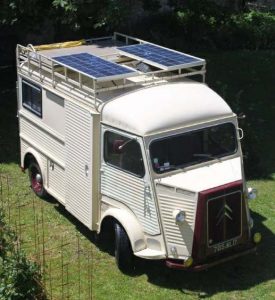20+ facts about solar panels on motorhomes, boats and caravans.
20 Facts about solar panels for your narrowboat, motorhome, yacht or caravan
We have been asked a lot of questions about solar panel installations on motorhomes, boats and caravans. Here are a few of our answers:
-
-
A solar panel will produce electricity on cloudy days and when the Sun is low in the sky. But it will produce far more on clear days and when the Sun is high in the sky.
-
Modern semi-flexible solar panels are just as efficient as traditional rigid framed solar panels. Make sure they use ‘monocrystalline’ technology. Semi-flexible solar panels.
-
To charge a 12 volt battery you need a solar panel with at least 34 individual cells. If you have less than this the panel will not charge your battery effectively. If you have more than 42 cells you may need a special charge controller. Contact us for more details.
-
A solar panel system is straightforward to install if you have average DIY skills. Use a solar panel kit to make things easier.
-
You must use a ‘charge controller’ in your solar panel system. This will protect the battery from overcharging and ensure that the battery is charged correctly and safely. Charge controllers.
-
You can charge your engine battery and leisure batteries from the same solar panel. You just need the right charge controller.
-
Tilting the solar panel up towards the Sun makes a big difference, especially from September to April.Try using an adjustable solar panel frames.
-
Charging your battery correctly will substantially increase it’s life. Make sure your charge controller has the following charge modes: 1.Boost/Bulk mode. 2. Absorption/PWM mode. 3. Float mode.
-
A second panel can usually be fitted alongside your existing panel. Contact us for more information.
-
Good quality PWM charge controllers have several battery charge modes. It will ensure that your batteries are optimally charged while protecting them from overcharge. In most circumstances they will charge your 12 volt batteries as well as an MPPT charge controller. MPPT charge controllers.
-
Polycrystalline panels are less space efficient than monocrystalline panels. Monocrystalline solar panels.
-
Your fridge is probably the highest consumer of electricity. Run it on gas or use much larger solar panels. Solar works well for fridges in the summer when you need it most.
-
A 100 watt solar panel can usually cope with LED lights, tablets, smartphones and small laptops during the summer. If you are running a television or a more powerful computer you will need a larger panel or a second panel.
-
A 12 volt battery should not be allowed to fall much below 12.0 volts. Use a charge controller with a LCD display to keep an eye on your battery voltage. Charge controllers.
-
The amount of useful sunlight in the winter is 1/5 compared to the summer.
-
Connecting a solar panel is simple. There are only two wires to the charge controller, and two wires from the charge controller to the battery. Connections.
-
You must put a fuse between the charge controller and the battery. There is no need to put a fuse between the solar panel and the charge controller. The easy way to fit a fuse.
-
You do not need to cover or disconnect your solar panel during the winter when you are not using your boat or motorhome. Effective winter charging.
-
You can add another leisure battery to your existing battery. This will double the capacity, effectively making one high capacity battery.
-
We can deliver solar panels directly to your marina or boatyard.
-
Solar panels can be connected ‘in-parallel’ to make one large solar panel. ‘In-parallel’ means connecting all the positive wires together and connecting all the negative wires together.
-
Try not to mix solar panel technologies when connecting the panels in parallel.
-
SunWorks controllers have been use on all types of boat and yachts including transatlantic rowing boats! As with all electronic equipment, the controller must be installed inside the boat, where it will give many years of reliable operation.
-
For the average motorhome it is not necessary to use isolating diodes. These are only required on much larger solar panel systems.
-
A SunWorks charge controller will control the electrical current from your solar panels to your batteries. Maximum current will be applied until the battery approaches full charge. The current is then reduced to safe levels. The battery charge is constantly monitored and the appropriate electrical current is applied to the battery. Battery life will be maximised and the performance of your solar panel system will be enhanced.
-
Facts about solar panels for motorhomes, narrowboats, yachts and caravans.
If you would like more information or would like to discuss our post ’20 facts about solar panels’, please do not hesitate to get in touch.
Tel: 020 8144 2475
Email: [email protected]


